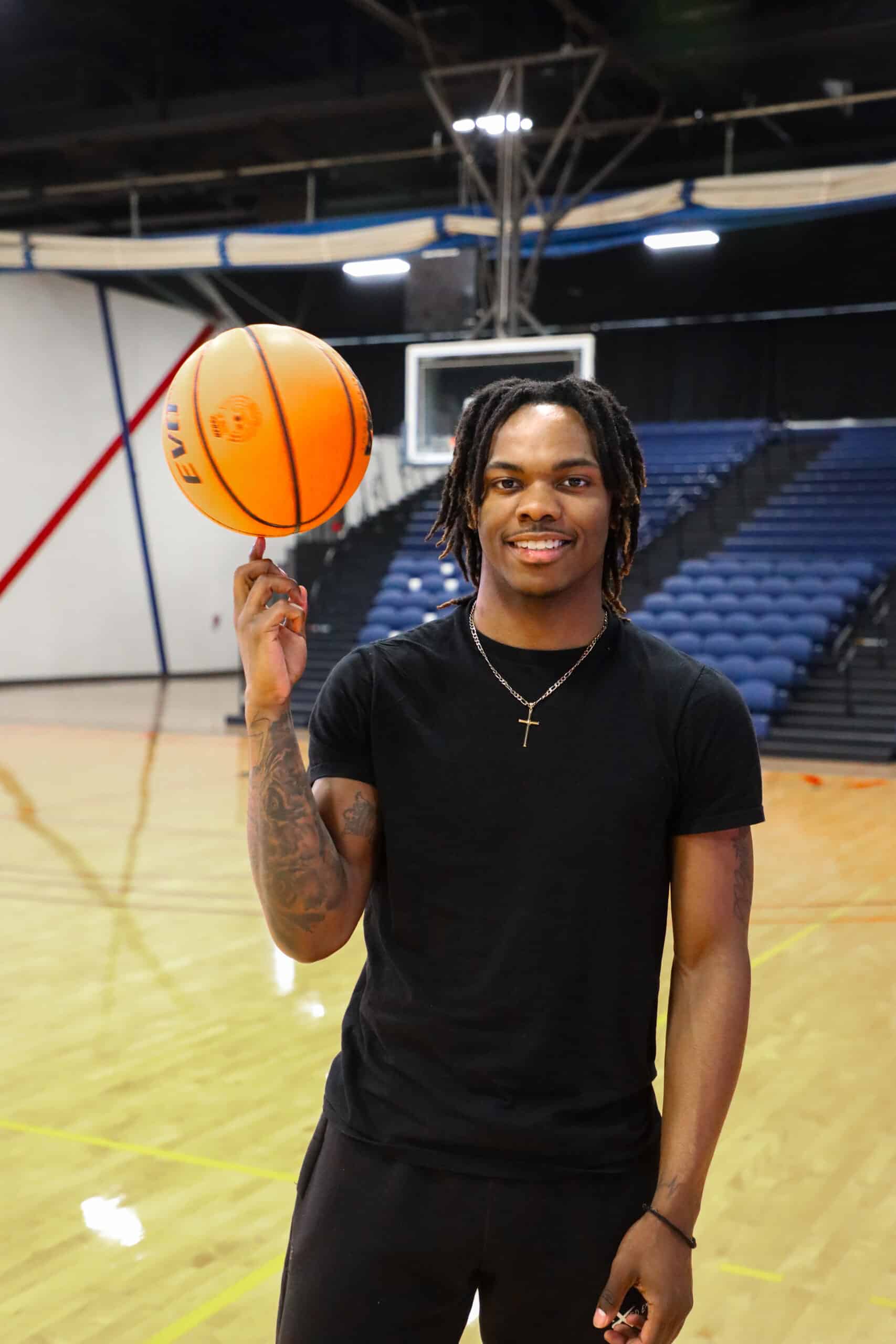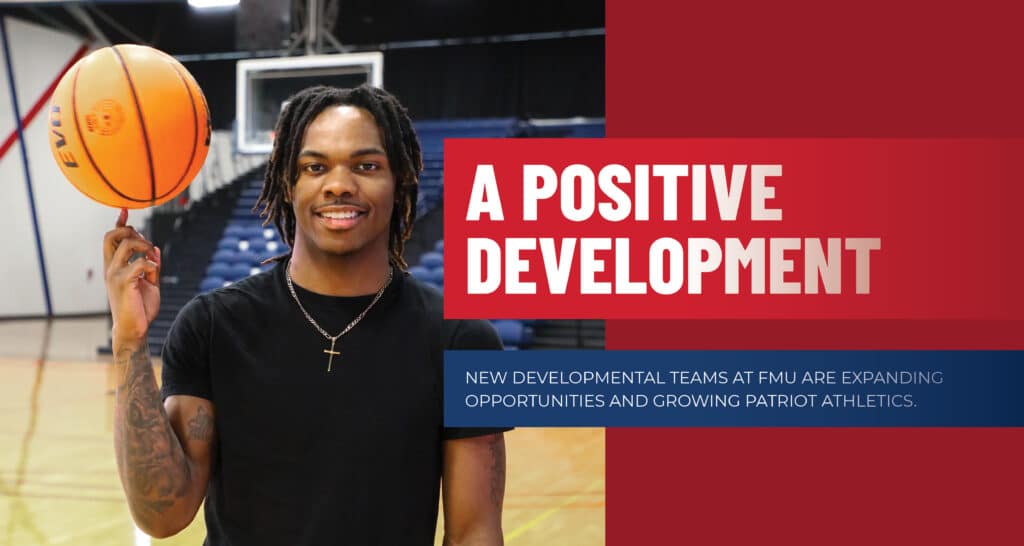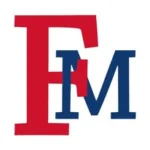May 7, 2024

A Positive Development
A Positive Development
By Tucker Mitchell | Spring/Summer 2024 | FMU Focus Magazine Spring/Summer 2024

Adonis Cole’s future came crashing down around him late in the summer of 2022.
A basketball scholarship to a South Carolina junior college fell apart, thanks to a series of coaching changes and institutional drama beyond his reach or understanding, and as the school year began, the Charleston native was an athlete and a student without a home.
And then the phone rang. It was Jake Zehnder, the head basketball coach at Francis Marion University, and he had an offer that Cole could neither imagine nor refuse.
There was an opening, Coach Z said. Come to FMU and play on the Patriots’ developmental team. No promises, but if Cole did well, who knows? One day he might move up to varsity.
And, oh yeah. School started the next day. Could he be there by 9 a.m.?
“I told him I’d be there,” says Cole. “So me and my mom, we started packing. I’m not sure I really understood everything he (Zehnder) was saying, but he had me at ‘play college basketball.’ As for a developmental team … I wasn’t even sure that was a thing.”
It was a thing, though, and a pretty good one for Cole, as it turned out.
He came to FMU, enrolled in classes, and began to practice basketball with his developmental squad teammates.
Five games into the season, Zehnder called to tell him he was bringing him up to the Patriots’ varsity team to help provide better competition in practice. By the end of the season, Cole was a starter. He’s been a starter, or a regular member of FMU’s rotation, ever since. The 6-1, 205-pounder’s aggressive, athletic play has helped propel FMU to the top tier of the Conference Carolina standings following a slow start this season.
“All I wanted was an opportunity,” says Cole, “and that’s what I got. It was up to me to do something with it.”
FMU is extending that same opportunity to dozens of athletes these days. Using a phased approach that began with simply expanding varsity rosters, FMU has added developmental teams in men’s basketball, baseball and men’s soccer. The women’s soccer team has expanded its roster and expects to field a developmental team soon. Discussions are ongoing about developmental teams in other sports.
The addition of the developmental teams has added 60-70 student-athletes to the mix at FMU. Coupled with the recent addition of an acrobatics and tumbling team, and an expansion of the Patriot track and field team (see story, page 15), FMU is fast closing in on 400 student-athletes, or close to a tenth of the student body.
‘Big success story’
That can present challenges, but Murray Hartzler, FMU’s director of athletics, says the expansion has been a big plus.
“The developmental teams have gone well, and we’re really just getting started,” says Harztler. “The biggest thing I’m pleased about, is that even though we’re raising the number of student-athletes, we have shown that we can maintain the academics, which is always foremost in our minds.
“As we were putting this together, the worry was that we might have students coming in — and since it’s the developmental team, most are non-scholarship — and if they are not having success, they might not put as much time and effort into academics. But our grade point average (GPA) for student athletes barely moved when we started, and this past fall, it was over 3.0 (GPA) again. So basically, we’ve been able to maintain the rate, even with 100 more student-athletes. I’ll have to say I was pleasantly surprised, and I have to give most of the credit there to our coaches and the careful way in which they’ve recruited. People think, ‘oh, they’ll just be taking anybody and everybody.’ But we’re not. This is a school with challenging academics and the coaches have done a great job finding kids who want to play, and who can do the work.
“It’s been a big success story for us.”
FMU began investigating the idea of developmental teams several years ago, as the Patriots began their move to a new athletic conference, Conference Carolinas. The new league includes considerably more private schools than the Peach Belt, FMU’s previous sports league, and private schools have some tradition in expanded athletic competition, often using it to help drive enrollment. FMU leaders knew their developmental teams would be able to play quality opponents in meaningful games in Conference Carolinas.
At the same time, they were moving to meet a need. There was clearly interest by more students in intercollegiate athletics than there were team slots to meet the need.
The idea received an enthusiastic reception across campus.
Dr. Fred Carter, FMU’s president, says providing more students with the opportunity to be real student-athletes, was a relatively easy decision to make.
“More students can be involved in intercollegiate athletics — and this is intercollegiate athletics, not club sports — and all the way around that’s a wonderful opportunity, both for the institution, for students, and frankly for the sports themselves.”
Hartzler and Carter worked hard from the start to put together a program that gives the developmental teams as close to a varsity experience as possible. That meant access to all of FMU’s superb athletic facilities, support staff, and quality coaching.
In most of the sports, new coaches were hired to lead the developmental squads. Most also have additional duties with the varsity teams.
Equipment is identical to what the varsity teams use. The developmental teams do wear hand-me-down uniforms from the varsity, but FMU buys new uniforms in most sports on a two-year cycle, so the used unis are not very used.
“When Dr. Carter and I sat down together, we agreed that it’s very important that we treat them exactly the same as everyone else, as the varsity players,” says Hartzler. “We knew that if we didn’t do that, we wouldn’t have retention, and it would become harder to recruit for those teams because word would get around.
“We’ve done a pretty good job with that,” says Harztler. “The coaches who coach those teams coach up the players just like they’re on the varsity. We have had to make some special accommodations while our locker rooms were under construction (FMU recently remodeled and expanded its locker rooms in the Smith University Center. See story, page 26.), but we take good care of them. And we’ve been careful to put together a quality schedule.”
Conference support
With help from Conference Carolinas, whose member schools are committed to providing top-notch experiences for all its athletes, developmental team schedules include games against conference opponents. Several sports — men’s soccer, men’s and women’s basketball, wrestling, men’s volleyball, and baseball — even have conference tournaments where champions are crowned. FMU’s developmental soccer squad won the conference tournament last fall in its first season of competition, and FMU has hosted two of the baseball championships at the request of the conference, which likes to show off the Griffin Athletic Complex, one of the league’s best facilities.
Chris Colvin, commissioner of Conference Carolinas, says the developmental team idea was driven by conference members, but has blossomed with help from the league office. The developmental tournaments were launched during his watch.
“Our fundamental idea is always to help our member schools accomplish their mission through athletics,” says Colvin. “We had a number of schools who were doing this, so we asked them, ‘how can we help?’ We support it in a number of ways, but the tournament is the most visible. And it’s really been a neat thing. We have more kids playing intercollegiate athletics and they really seem to like it. Some of the championship celebrations (at developmental tournaments) have been bigger than anything we’ve seen with varsity teams.”
Says FMU’s Hartzler, “It is great for our teams to have something to look forward to, to play for something. Makes a difference in terms of concentration. It was not in place when FMU joined, it was just getting talked about, but Chris Colvin and company got it going not long after he got there. It came together and has added to this initiative.”
The majority of the developmental games in every sport are home games, another tip of the hat to the university’s commitment to academics. Avoiding long road trips helps ensure the players have sufficient time for their studies. Schedules vary by sports. Baseball at FMU is playing a 14-game schedule, plus the tournament. Basketball and soccer played 8-10 games.
Developing players
FMU Baseball Coach Art Inabinet oversees the largest developmental squad at FMU. The Patriot baseball program now has 65-70 team members. The numbers break roughly into 35-40 varsity players and 30 on the developmental team, but the counts are fluid because of the way the program is managed.
The entire team practices together, with instruction and supervision from the entire coaching staff. The team uses the same locker rooms and training facilities, too.
“The only time there’s any separation is on game days,” says Inabinet. “The varsity goes to play their games when it’s time, and the developmental team goes and plays its games.
“That’s how Dr. Carter and Murray envisioned it, and it makes a lot of sense,” says Inabinet. “I can put myself in the player’s shoes. If I felt like I was being treated in some kind of second-class manner, practicing in a different place or at a different time, with different equipment, I might not be too interested in this. As it is, we don’t have any trouble getting players interested in this, and our retention has been good, surprisingly good, I think.”
Like men’s basketball, baseball has already received important, on-field contributions from at least one player. Chesterfield’s Josh Adams came to FMU as a developmental player for the 2021-22 season, but quickly blossomed. He was among FMU’s best pitchers out of the bullpen in ’22-23 (3-0, 2.75 ERA, 5 saves), and is now one of the Patriots’ three weekend starters.
“He’s a kid who learned what he needed to be successful at this level and then developed it very quickly,” says Inabinet. “That’s exactly the kind of opportunity that’s available here.”
Inabinet has also seen a player, Peyton Britt, graduate after spending four years at FMU as a developmental player. He dressed for, but didn’t play in varsity games, his senior year. Degree in hand, he’s now preparing for a career in law enforcement.
Inabinet and company have also used the developmental team to find game experience for varsity players. A player who isn’t getting a lot of varsity playing time can get a few live at-bats, or pitch an inning or two, continuing his development while biding his time.
“(The developmental program) has allowed us to make sure everyone who comes here gets to play,” says Inabinet. “That’s been a big benefit. It’s been good for us, but I think it’s been good for the young men here, too. We’re giving more students the opportunity to participate in college sports. I think that’s a very good thing.”
Hartzler says the new teams have exceeded most expectations.
“We’re giving more kids an opportunity and we’re doing it the way we’ve always done it,” says Hartzler. “They have to perform in the classroom, and they have to come to practice and work hard. They’re always told that the best will play. If one of the best is on the developmental squad, well, then that will happen.”
Just ask Adonis Cole.
“This isn’t how I imagined my career would go,” Cole says, “but this has really been great. It’s a great idea. You wouldn’t believe the number of people I know back home in Charleston who, when I tell them about this, say, ‘how can I do that?’ It’s a big deal.”






